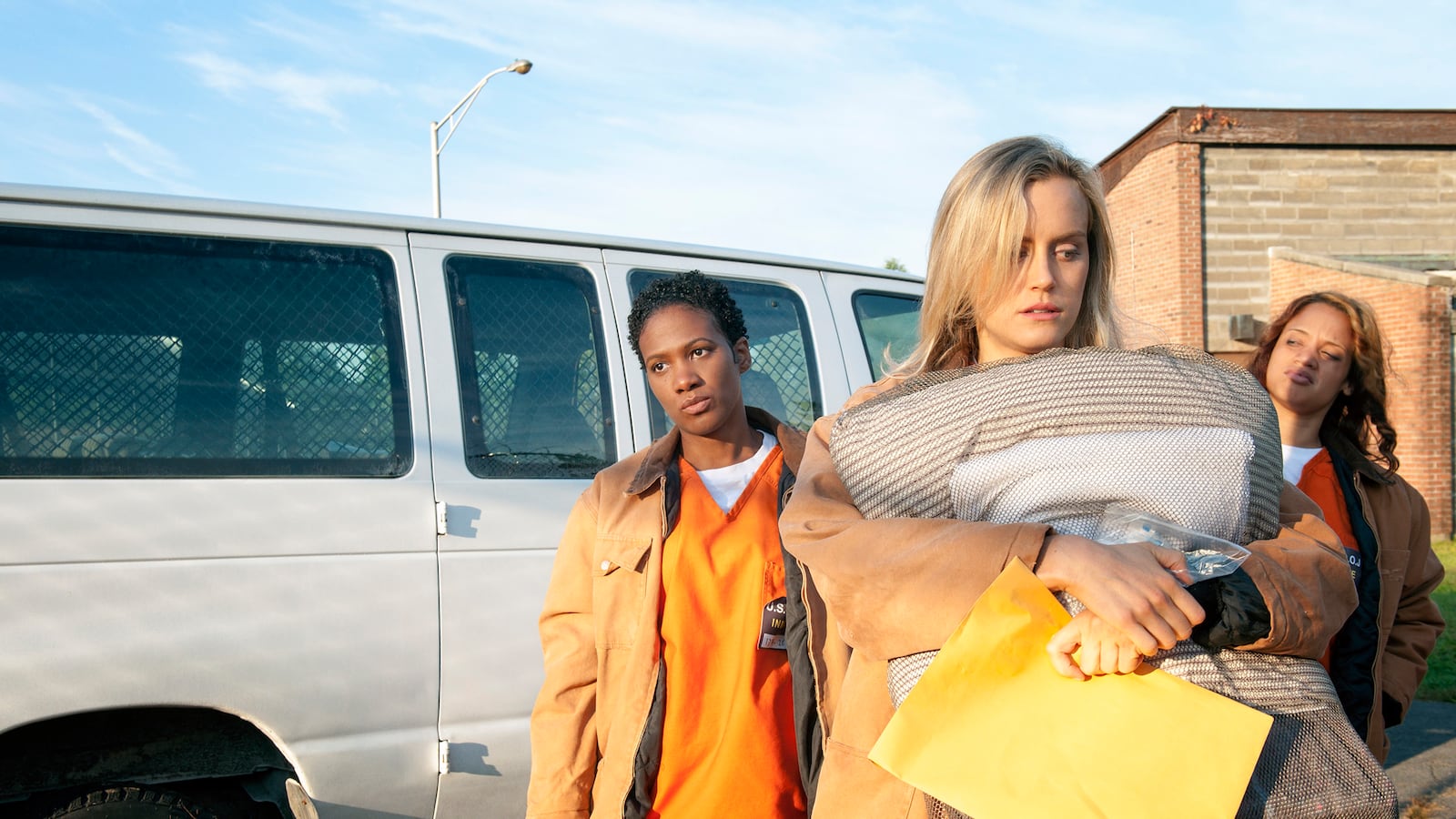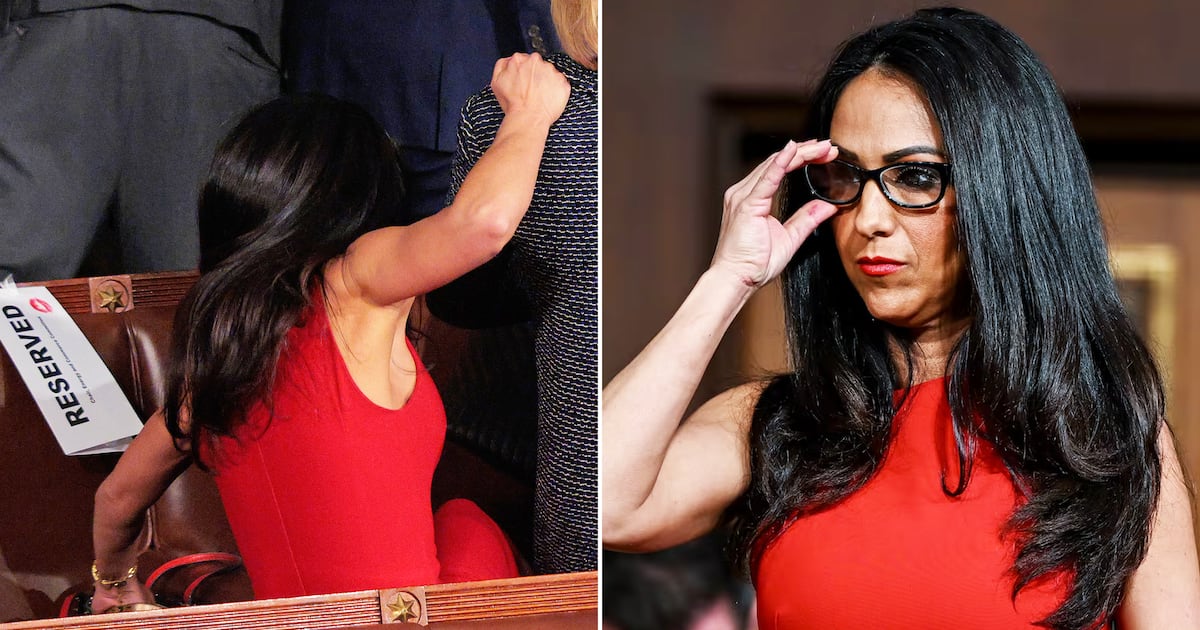To binge or not to binge? When it comes to Orange Is the New Black, the new Netflix series by Weeds creator Jenji Kohan, that is the question.

Orange debuted on Netflix this morning at 12:01 a.m. Pacific time—all 13 episodes at once, as has become Netflix’s wont. (The streaming movie-and-TV site did the same thing with its first two in-house series, House of Cards and a revival of Arrested Development.) And thus viewers who have enjoyed Netflix’s original programming to date, and who are also somewhat impatient, especially about a crackling good television show, and who therefore tend to become rather, shall we say, “addicted” when they no longer have to wait a week for their next fix—not that I would know anything about that—were faced with a very trendy dilemma.
Do I indulge my streaming-video habit? Do I lose sleep? Do I miss work in the morning? Or do I step away from the remote and regress, becoming the quaint sort of character who watches only one episode at a time?
Dear reader, I confess: I chose the former. I watched five straight installments of Orange. And now I have resurfaced, marginally paler, from the strange, glowing not-world of late-night streaming video to urge you to binge on Orange, too.
Before we go any further, a disclaimer. Orange is not a Great Television Show. Not yet, at least. It may be the best thing on quote-unquote TV right now, but that’s only because Game of Thrones just ended and Breaking Bad doesn’t return until August. And yet Orange is the kind of show that deserves to be seen—and that might have been overlooked, or even dismissed, in that bygone era before bingeing on a new series was possible.
I say this because if one episode was all I could have watched, I would have dismissed it. The premise of Orange is promising enough. A WASP-y Smith alumna named Piper Chapman (Taylor Schilling) has a lesbian affair after college. Her paramour Alex (That ’70s Show’s Laura Prepon) works for an international heroin cartel. Seeking adventure—and the chance to prove that she’s more “special” than her milquetoast Connecticut upbringing would seem to allow—Piper eventually agrees to carry a suitcase stuffed with $100,000 in drug money through a couple of airports.
Fast forward. Ten years later. Piper is now engaged to a writer named Larry Bloom (Jason Biggs, playing a post-grad-school update on his American Pie character). They live in the sort of whitewashed Brooklyn apartment that tends to show up, artfully overexposed, in the prettier shelter magazines. Piper makes “artisanal soap” that is “carried at Barneys.” Larry writes. They adore Mad Men. They shop at Whole Foods.
Then, suddenly, Piper is charged with money laundering—the statute of limitations on drug offenses is 12 years, it seems—and thrown into a minimum-security prison in Connecticut with a motley crew of meth heads, murderers, and at least one transgender credit-card fraud perpetrator. Fish-out-of-water antics ensue. And all of it is based on a true story, ably set down by Piper Kerman in her 2010 memoir, from which the Netflix series takes its title.
The problem is the pilot (and to a lesser degree, the second and third episodes). In order to maximize the tension between Piper and her new environment, Kohan constantly reminds us how coddled and ridiculous Piper and Larry are. She makes him promise he won’t watch Mad Men without her. They argue about a juice cleanse. She says that while she’s in the clink she’s going to “learn a craft” and “get Jackie Warner ripped,” as if jail were just another summer in Tulum. At one point she asks him to describe, over the prison phone, the groceries he has just purchased from Whole Foods. He does—the tomatoes are “engorged,” and so on—and she moans orgasmically.
Unfortunately, Kohan’s initial approach has a fairly serious drawback: it makes her protagonist too much of a Sunday Styles cartoon character to care about. And so one watches, at first, out of curiosity more than anything else. After all, we aren’t often invited into a women’s minimum security prison—even on television, where the Oz version of incarceration is still the prevailing stereotype—and the anthropology of the place is fascinating. Inmates sleep on top of their made beds, never inside. Blacks socialize only with blacks; Latinas with Latinas, whites with whites. Visitors are allowed two hugs, one when arriving, one when leaving. There are none of those gloomy cellblocks you always see in the movies, just open white cubicles. Lesbians are everywhere.
But subcultural tourism can only sustain a television show for so long, and Kohan is smart enough to realize it. The fourth episode of Orange is the turning point. I won’t divulge any plot points here, but as the series progresses, Kohan’s focus begins to shift from Piper to her fellow inmates—the Russian cook Red (brilliantly played by Kate Mulgrew); the Haitian lifer Miss Claudette (Michelle Hurst); the male-firefighter-turned-female-beautician Sophia (Laverne Cox); the loudmouthed addict Nicky (Natasha Lyonne)—and the show suddenly gets a lot deeper.
These are not the sort of women—angry women, butch women, older women, unskinny women—we usually see on TV. We flash back to their previous lives; we learn why they’re locked up; and we begin to realize, just as Piper eventually does, that our nice blonde protagonist is “no different than anyone else in here.” Basically, they all “made bad choices.” What seemed, at first, like a series all about Piper Chapman’s bemused perspective on prison—in other words, a fairly pat dramedy—becomes precisely the opposite: a series that encompasses many clashing perspectives, and shows how they’re all, in some elemental way, the same.
Turns out bingeing isn’t only good for watching the shows you’re already addicted to. It’s also a good way to make sure you don’t miss out on the shows you should be addicted to next.






